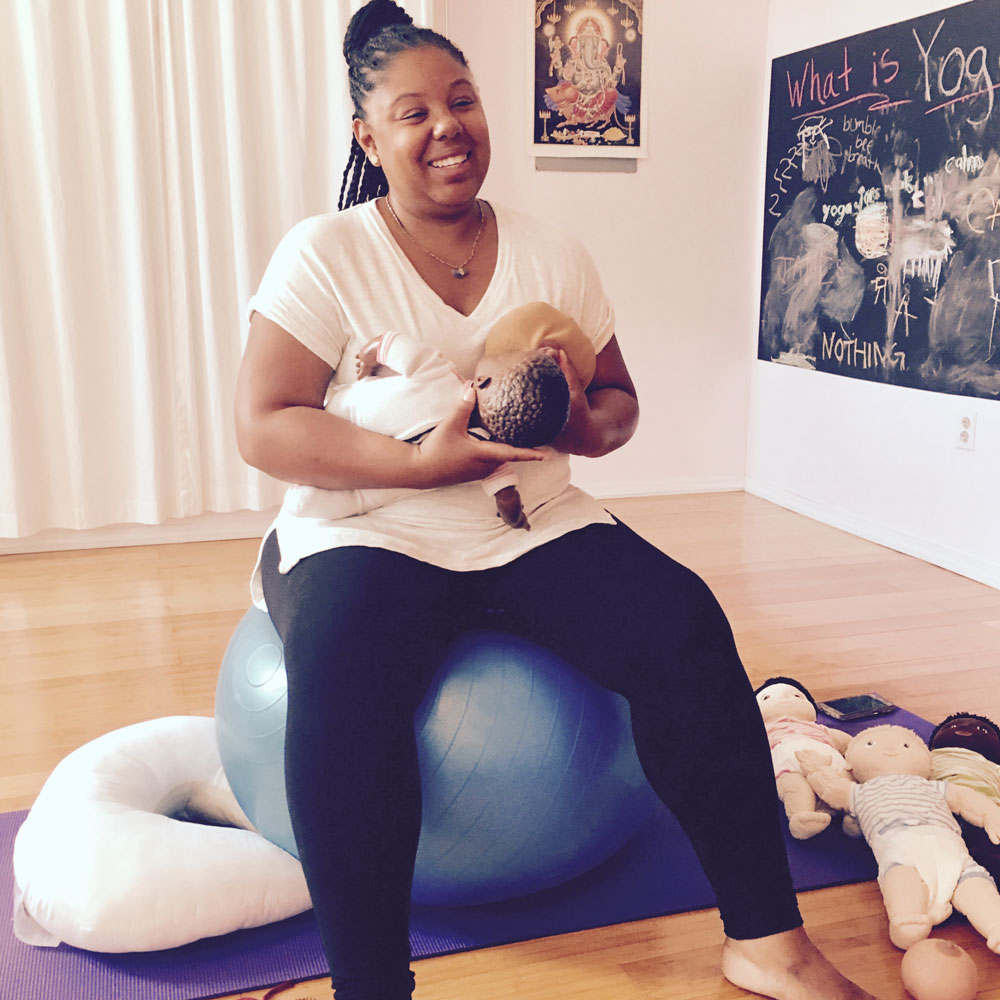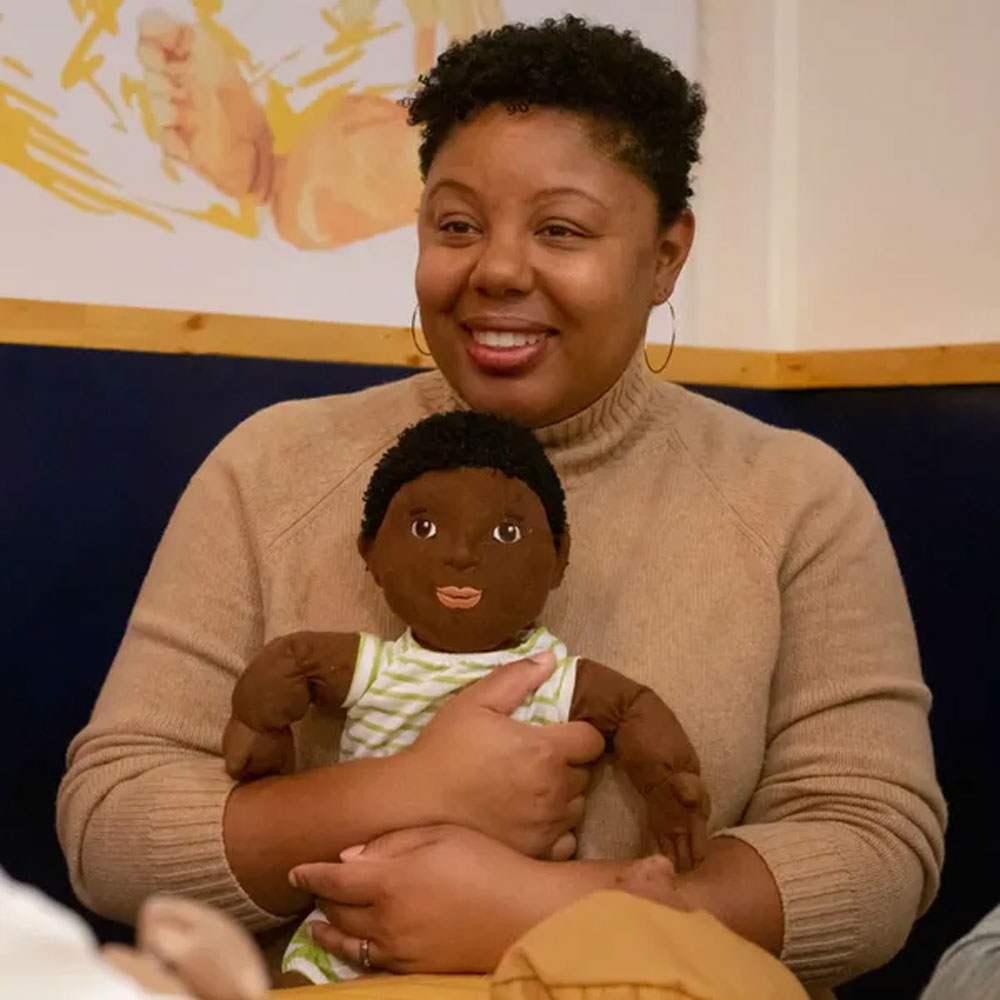Q&A with Lashanda Dandrich
IBCLC - Black Breastfeeding Week 2019
We asked the talented LaShanda Dandrich, IBCLC, a boober provider and the driving force behind Uptown Village Cooperative, to shed some light on what she does day-to-day to help families, how she got here and what keeps her going. This week is Black Breastfeeding Week and boober also wanted to share her thoughts on why Black Breastfeeding Week is so important.

Can you please introduce yourself? Who are you and what you do?
LaShanda Dandrich, IBCLC (International Board Certified Lactation Consultant) and trained postpartum doula. I have been certified as an IBCLC for 5 years. I have worked all over NYC assisting families in the immediate postpartum period. I have worked for several NYC hospitals and the NYCDOHMH Newborn Home Visiting Program. I currently facilitate lactation support groups throughout the city and do in-home lactation visits.
1. What motivated you to become an IBCLC?
My motivation for becoming an IBCLC was the experience of breastfeeding my daughter. When I started to talk about my breastfeeding experience (which was empowering!) with friends, many of whom had children before I did, I started to learn (as most people do) that everyone’s experiences are so different but there was a theme that emerged. They all said it was hard to do and most of them did not do it for long. And I also learned that some never did it at all and could not imagine breastfeeding. Slowly I learned of all the myths that are out there. I knew none of these myths before, except the one: "it is supposed to hurt.” I wanted to help dispel those myths and help others have the positive experience I had. And the biggest issue of all for me was that Black women were the least likely to breastfeed this definitely fueled my journey to becoming an IBCLC.
2. Did you personally experience any barriers or challenges to becoming an IBCLC?
The biggest barrier to becoming an IBCLC for me was finding the time to complete the mentoring hours. I was lucky to have found a hospital that had an internship program (I actually worked at the hospital as a physical therapist assistant prior to becoming an IBCLC). But working full time and having a young child became a juggle especially because I was eager to start my new career.
3. We understand you recently transitioned from working as an IBCLC in a hospital setting to working privately. How have those experiences been different?
Each setting has its pros/cons. For me working in the hospital was leaving me questioning my skills as an IBCLC. The nature of the hospital is fast paced and I like to be able to take time to tailor my consultation to the family, which home visits and even group visits, give me the chance to do. I also loved being able to get to families in the immediate postpartum period while at the hospital and setting them up for success (though I always urged families to follow up with an LC at home, even if things were "all good")!
4. Describe a typical day in your life as an IBCLC?
I don't have a truly typical day! Which is what I wanted as someone who works for themselves. I also should mention that in addition to groups and home visits, I teach Infant Care, Breastfeeding prenatal to families and Breastfeeding for professionals. I am also big on building the lactation profession so I mentor future IBCLCs as well. And I’m the parent to a pre-teen. My day/ week is most likely a mixture of all of the above!
5. What type of family do you usually work with?
I see a wide variety of clients. I work through referrals from services such as Boober, but also through Doula agencies. So I have clients that can pay for my services. I also work with CBOs (community based organizations) where there are families that can not afford to pay. So services are either covered through the CBO or I do have the opportunity to offer sliding scale/ pro bono visits. I have seen clients of every economic background here in NYC.
6. What is the longest and the shortest time you have stayed with a family?
There shortest time I spend with clients is 60 minutes. This is usually a "quick" latch fix issue. But still covers pumping for the future if the family has questions. We can also cover and discuss what breastfeeding will look like beyond the first few weeks. I also try to keep the visits to 2 hours maximum. This is my personal style as an LC. I have found that if the visit runs longer than that, families (baby included) start to get fussy and not retain the information. I always leave the family with a plan and follow up in a few days.
7. What are the most common questions /requests you get from parents?
I think all people in the birth world get the same questions. Especially If you are working with lactating parents, it is most often about milk supply and infant feeding patterns. Of course sleep is the other topic that raises many questions. I would say the number one request I get is "can you come home/ move in with us" to which I always say I am currently working on cloning myself!
8. What was the best part of your workweek? (or a recent week!)
A pretty cool highlight to my week this week came through social media. I have contributed to a blog about breastfeeding and my company Uptown Village Cooperative (@uptownvillagenyc) was tagged in the post. A past client commented that I "saved [her] life with breastfeeding her son". This is always so cool to hear because sometimes you are just with a client for one visit and a few follow up calls/emails, but may not see them in person again. And depending on the reason the consulted with you, you always kind of wonder how that breastfeeding journey is going for them. So to see that you made a positive impact gives you all the feels! I love running into clients on the street weeks or years later! As I am sure all LCs do....so don't be afraid to give your LC a shout out! Also get the same feeling when I see someone on a FB parenting group that recommends me!
9. And what made you angry or sad recently while you were out and about helping families?
The fact that Black women and women of color experience such a lack of true breastfeeding support continues to make me extremely upset. The information that families tell me they are getting from health care professionals regarding breastfeeding is sometimes just plain idiocy. Part of being an IBCLC is knowing the scope of your training and when to refer a client for more help/ support. It would be so much more beneficial to families if their health professionals would be more forthcoming about the fact they did not truly study breastfeeding and admit to what they dont know and refer patients to a lactation professional first/ in addition to suggesting formula supplementation. My Black clients truly experience racial bias. When a healthcare professional thinks that a particular client will not breastfeed because of the myth that Black women do not breastfeed has been passed down through generations. This type of thinking is not based in medical knowledge, but many medical professionals continue to base their interactions with Black families on this false knowledge.
10. As an IBCLC, what are you looking forward to right now?
I am in the process of creating more access to mentorship for those looking to become an IBCLC while at the same time creating more access to lactation help for all communities. Especially the communities with the need for higher level lactation assistance.
11. What problem do you wish you could resolve right now for new parents?
Expanding the breastfeeding education of doctors during medical school (ask your OB/ Pediatrician exactly how much breastfeeding education they have received, the average is about 1 hour!) would help immensely. Especially to those that are working with mothers and babies. Requiring all hospitals and pediatrician offices to have dedicated lactation staff. And of course having lactation fully covered by insurance would be just a basic start. We can also go into developing true maternity leave for all families.
12. It is Black breastfeeding week and we wanted to hear your point of view as to why you think we need to highlight this matter to the public?
Black Breastfeeding Week falls right in line with Black Lives Matter. Black babies are literally dying from the lack of access to the most beneficial medicine available to them.....their mother's milk. The statistics do not lie. Black infants are more likely to be born prematurely, Black children are more likely to develop diabetes, asthma and childhood obesity. All of which can be combated if that infant is breastfed. For me it is a no brainer that medical professionals should be clamoring to figure out how to get more breast milk to this population. Instead you still have medically trained practicing individuals that do not feel that Black women breastfeed and that Black women’s breast milk is "not good enough" to nourish their babies. This is the thinking that still persists in the medical community. As long as these individuals still exist "Black Breastfeeding Week" will continue to thrive to combat the negative stereotypes that continue to harm our babies and our bodies.
13. How can we collectively best help change the tide?
Just like racism in any other form, it. It is not enough for the community to say that "we support Black breastfeeding week" and other movements. You have to proactively show support in order to bring about change. This means calling out/educating your fellow colleagues, white or any other race, about the disparities. Especially those that have a direct interactions with the Black maternal community. This means if you have a business, making a conscious effort to hire/ collaborate with Black birth workers, lactation professionals so clients have access to support from Black professionals. Actively look into how you can help grow the lactation field by offering access to mentorship to future Black lactation professionals. As I stated, when getting into the lactation field, this point was and is very important to me. I am always happy and willing to collaborate with others to continue to work toward ending this disparity and growing the lactation profession!

LaShanda Dandrich is an International Board Certified Lactation Consultant, IBCLC and co- founder of the worker owner Cooperative, Uptown Village Cooperative. After the birth of her daughter in 2009, her passion for breastfeeding and supporting mothers and families in the postpartum period blossomed. She became a trained postpartum doula while pursuing her IBCLC credential. She has supported families of all diverse, cultural and socio-economic backgrounds throughout NYC. She resides in Harlem with her 10 year old daughter.
Q&A with LaShanda Dandrich IBCLC - Black Breastfeeding Week 2019